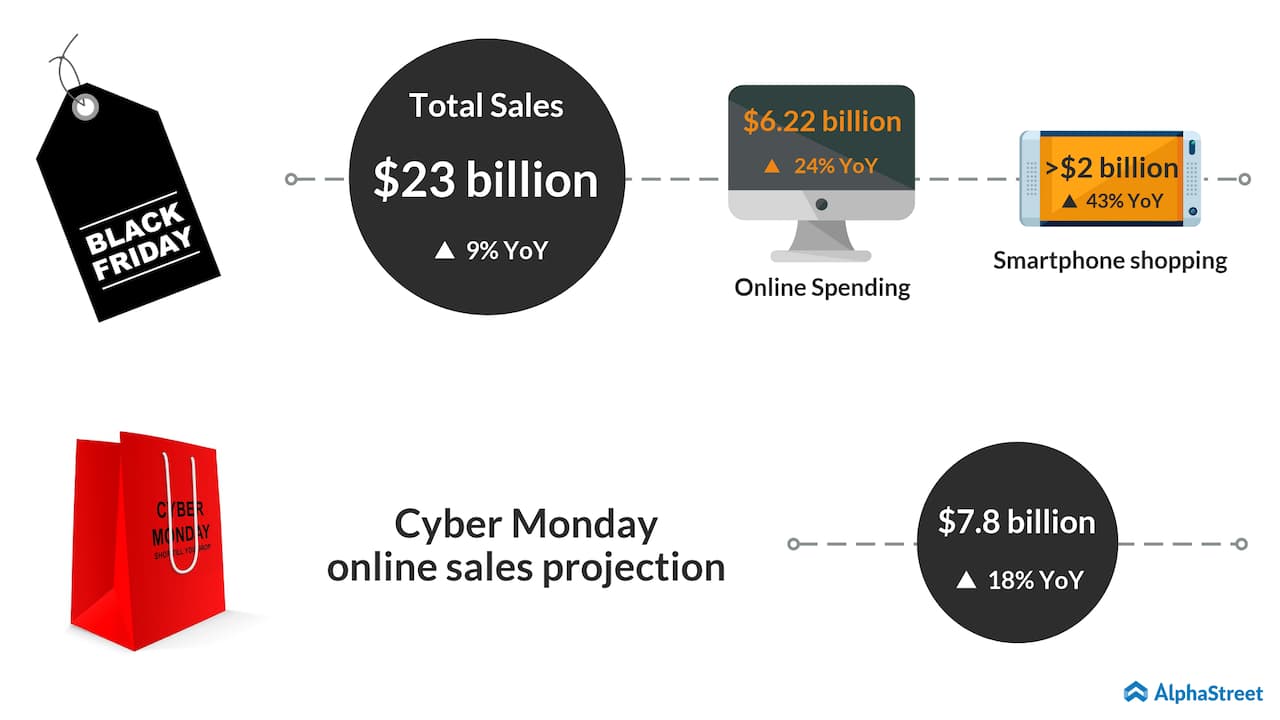
The distinction between Black Friday and Cyber Monday is slowly diminishing as more people prefer online shopping over actually visiting the stores. Total online sales climbed 29% from last year to a record $6.22 billion, according to Adobe Analytics.
While Amazon (AMZN) continued to dominate the online shopping realm, rivals who had put in considerable amount of investment into digital space – including Walmart (WMT), Best Buy (BBY), Target (TGT) and Macy’s (M) – reaped benefits.
From Wednesday to Friday, total online sales witnessed a year-over-year growth of 26% to $12.3 billion, Adobe stated based on the activity recorded from thousands of online retailers.

Mobile shopping at a record high
Smartphone shopping accounted for over a third of the total online spending this Black Friday. Over $2 billion worth of items were purchased through smartphones last Friday, an all-time high. According to the Adobe report, mobile spending as a percentage of total online spending grew to 33.5% from 29% last year.
It was also seen that a 10% rise in browsing time often leads to smartphone spending.
Brick-and-mortar collapse
Store traffic fell for the fourth consecutive year, according to data compiled by RetailNext. As per this report, store traffic fell 5-9% during Thanksgiving and Black Friday. Attractive discounts on online stores as well as harsh weather in the northeast are expected to have contributed to this decline.
Why Target is a better investment than Walmart this holiday season
Buy-and-pick shopping in vogue
As a silver lining to the traditional retailers, the buy-online-get-from-store method of purchase proved to be successful this holiday season. Orders rose 73% in this option, made available by Walmart, Target and Kohl’s (KSS), during the Thursday and Friday.
Thanksgiving Day as a shopping holiday
Another big trend that took shape this year was the emergence of Thanksgiving Day as an internet shopping day. For the first time in history, discounts on Thanksgiving Day were are attractive as those offered on Black Friday on most e-commerce sites, making it the beginning of the holiday shopping season.
Sales jumped 28% on this Thanksgiving Day and Adobe dubbed it the fastest growing online shopping day.
Online stores preferred for pricey products
Consumers preferred online mode to purchase expensive items including furniture, electronics, and home appliances. Online orders averaged at $146, a 9% increase from last year. Electronics continued to dominate online sales, primarily driven by Nintendo Switch and smart assistants.
Brace for the biggest Cyber Monday
Thanks to an enthusiastic beginning of the shopping season, consumers and retailers may now expect a record-breaking Cyber Monday. Market watchers estimate an 18% jump in Cyber Monday online sales to a whopping $7.8 billion.